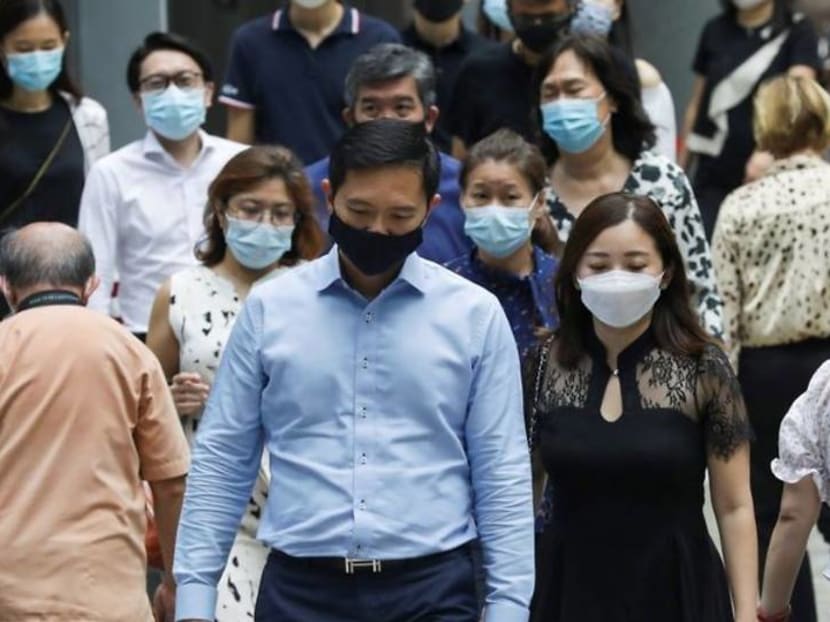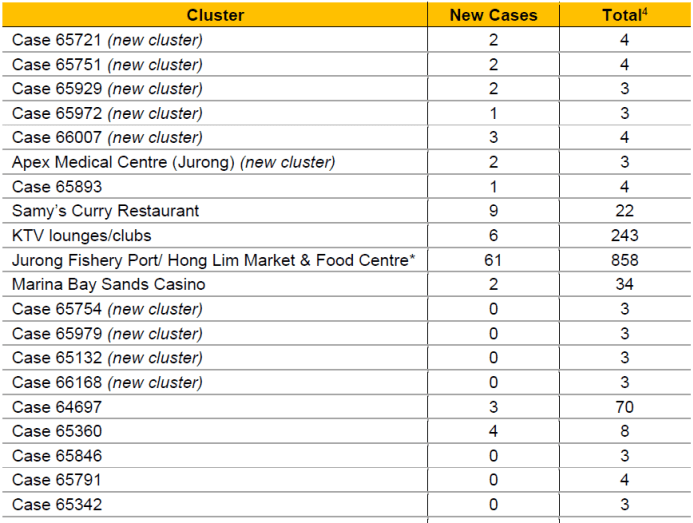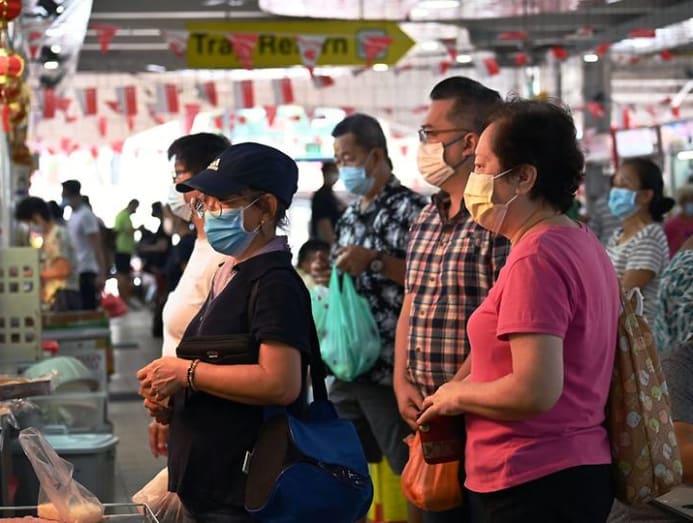Commentary: Lack of info on COVID-19 cases can cause unnecessary anxiety
Perhaps we can’t help ourselves when a deluge of information seems to hold some vague promise of doing better at beating back this pandemic, Vivian Teo says.

FILE PHOTO: Office workers wearing masks cross a street during lunch hour, amid the coronavirus disease (COVID-19) outbreak, in Singapore May 12, 2021. REUTERS/Dawn Chua
SINGAPORE: By now, most of us have probably obsessed over COVID-19 numbers for more than a year.
We’re all stalkers of coronavirus statistics one way or another, thinking to ourselves that if we can just track and trace where each case came from, where there might be another cluster, we can keep ourselves safe.
This geeky, pseudo-technocratic approach to problem-solving is pretty Singaporean. Perhaps we can’t help ourselves when a deluge of information seems to hold some vague promise of doing better at beating back this pandemic if we only applied some analysis and investigative skills.
Spoiler alert: It doesn’t help. Spoiler alert two: But it doesn’t matter because not knowing creates unease.
READ: Commentary: Malaysia’s coffers run dry as COVID-19 pandemic worsens
CLUSTERS WITH NO INFO
I was thinking about this when taking a more detailed look at the latest list of active COVID-19 clusters released by the Ministry of Health (MOH) this week. It had me wondering about the point of the list.
You see, most of the clusters are simply case numbers with no other information other than the new and total number of cases associated with said cluster.
In the Jul 26-dated list for example, there was a cluster known as “Case 64697” with three new cases and a total of 70 cases. But where was this mini super-spreader event? What caused this outbreak?

And so I did what most of us do – I took to tap on the power of crowds so I jibed on my social media.
Why isn’t there more detail about what this somewhat large and potentially significant cluster of 70 cases? Was this not worrying? Does the public have a right to know?
The collective wisdom replied. Some well-meaning friends said I could Google the case number and I’d find news reports mentioning that “Case 64697” is linked to residents at Block 639 Rowell Road, two of whom attended lessons at Comfort Delgro’s Ubi driving school.
Right. But what about the other twenty something anonymous clusters? The Google-sphere would not have information on all clusters. After all, MOH has said it will no longer disclose details of new cases detected in the community in end-June as part of this shift towards living normally with endemic COVID-19.
READ: Commentary: Vaccine passports are within reach but important details must be worked out first
This changed posture also extends to COVID-19 cases in schools. Unlike in May when the Ministry of Education had announced cases in schools – in which we learnt about the more than 40 cases from 30 schools in a month – it appears it no longer does that.
Instead, these days, schools would issue circulars to parents informing them of confirmed cases in their children’s schools. These would be shared aggressively on social media, then make its way to news platforms.
I’ve seen such notices online. Some of my friends have received them too from their kids’ schools.
This change in practice is understandable if authorities don’t want to create undue anxiety or heighten sensitivities.
READ: Commentary: Surviving home-based learning in the long haul may require parents to dial back on kiasuism
Just because one student catches COVID-19 does not mean the whole school will. Closer contacts like classmates of the student who are of highest risk will probably be informed individually and advised on any needed quarantine.
Doing so could also stigmatise places that were venues of transmission, which would be a huge detriment, for example, to F&B outlets already struggling to survive.
UNCERTAINTY BREEDS ANXIETY
And yet, because of this lack of clarity, I find myself combing through news websites and social media for more information on clusters and cases of late.
Why do I need to know? I don’t. But most of us would agree that we do not like uncertainty and that uncertainty causes stress.

A University College London study in 2016 illustrates this effect. In a computer game where 45 volunteers had to guess whether rocks had snakes under them, volunteers would receive a mild electric shock if there was a snake.
Although over time they learnt to discern which rocks were most likely to harbour snakes, the experiment designers would change those odds throughout the experiment and measure the anxiety levels of participants.
The results were surprising. It turns out that it's much worse not knowing whether you were going to get a shock than knowing you definitely will, said the study’s author Archy de Berker.
READ: Commentary: Managing COVID-19 risks on navy ships with small spaces is insanely challenging
This concept is applicable in real-life. "When applying for a job, you'll probably feel more relaxed if you think it's a long shot or if you're confident it's in the bag,” said co-author Robb Rutledge.
“The most stressful scenario is when you really don't know. It's the uncertainty that makes us anxious. The same is likely to apply in many familiar situations, whether it's waiting for medical results or information on train delays."
This certainly clarifies. Knowing confers some certainty on one’s own situation and whether one has had a higher risk of exposure to COVID-19.
I may not have control over who the virus infects or the authorities’ decisions but I can make my own decisions when I have the information, for instance, if certain places I have been had cases, and that gives me some semblance of control.
Although then again, my TraceTogether would alert me to exposure risks.
Still, there is upside to paying attention to the news. Knowing the clusters and cases puts into perspective our current situation. These remind us that COVID-19 is still a threat when cases can and do happen at any place we frequent. It is a reminder to exercise caution and get ourselves vaccinated.
(Are on-off curbs on dining in Singapore prompting F&B operators to rethink staying in the business? Find out from Ya Kun Kaya Toast's Jesher Loi and chef-owner Anthony Yeoh on this week's Heart of the Matter podcast.)
LIFE IS NOT NORMAL YET
We all suffer from some form of COVID-19 fatigue and we all crave for life to return to normal. The good thing is there is an end in sight. As authorities have spent much time explaining, once we have enough people vaccinated, we can ultimately learn to live with COVID-19 as an endemic disease.
The day will come when COVID-19 cases are no longer seen as unusual but treated like the common flu where we don’t obsess over numbers and let fear distort our ability to press on with life.
When that happens, we’ll probably no longer see COVID-19 cases being reported by MOH. For now, it’s nice to see MOH begin that process of diligent daily reporting with one on vaccination rates.
But we are not there yet, not with cases still high and new clusters forming.
READ: Commentary: Inaccurate public understanding of COVID-19 vaccine efficacy has implications for vaccination rates
Meanwhile, every unexpected school circular about cases will bring fresh worries about whether something slipped through the cracks, never mind our obsessive safe management measures implemented in public spaces.
So rather than downplay the COVID-19 cases, why not just continue to include first-level details like the location or how each cluster came about? It would save us time and effort trying to piece together the puzzle from various sources which may not be accurate in the first place.
Frankly, I will only be able to truly rejoice about the easing of restrictions and life returning to normal when I can see from the numbers that we have the COVID-19 spread under some form of control.
But for now, it would really help if that information was readily given. And for those of us in the “ignorance is bliss” camp, you can choose to hide certain notifications in your social media or scroll past news you do not wish to see.
BOOKMARK THIS: Our comprehensive coverage of the COVID-19 pandemic and its developments
Download our app or subscribe to our Telegram channel for the latest updates on the coronavirus outbreak: https://cna.asia/telegram
Vivian Teo was a financial journalist for 14 years. She is also a mother-of-two and children’s book author.





